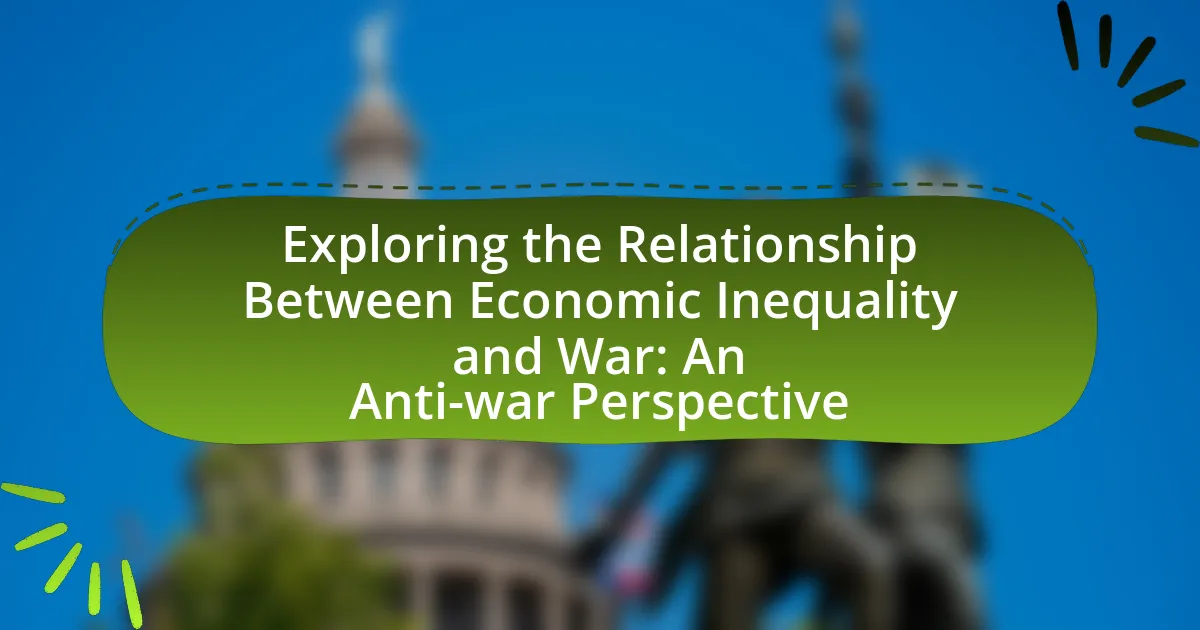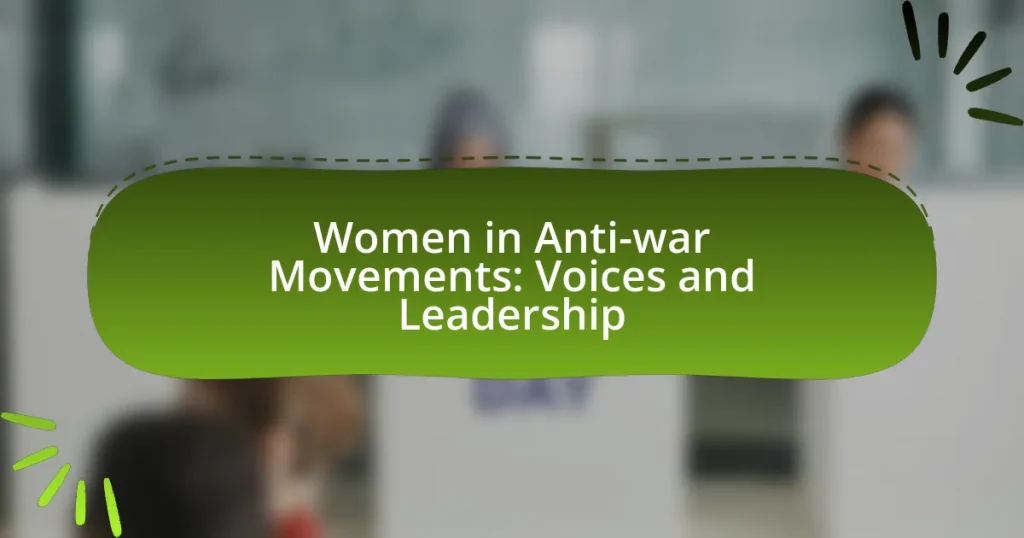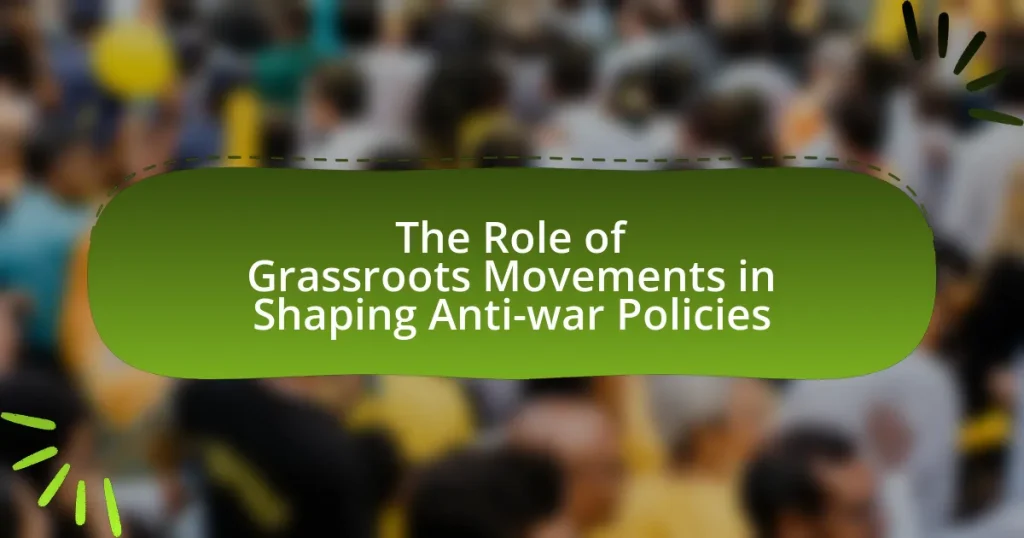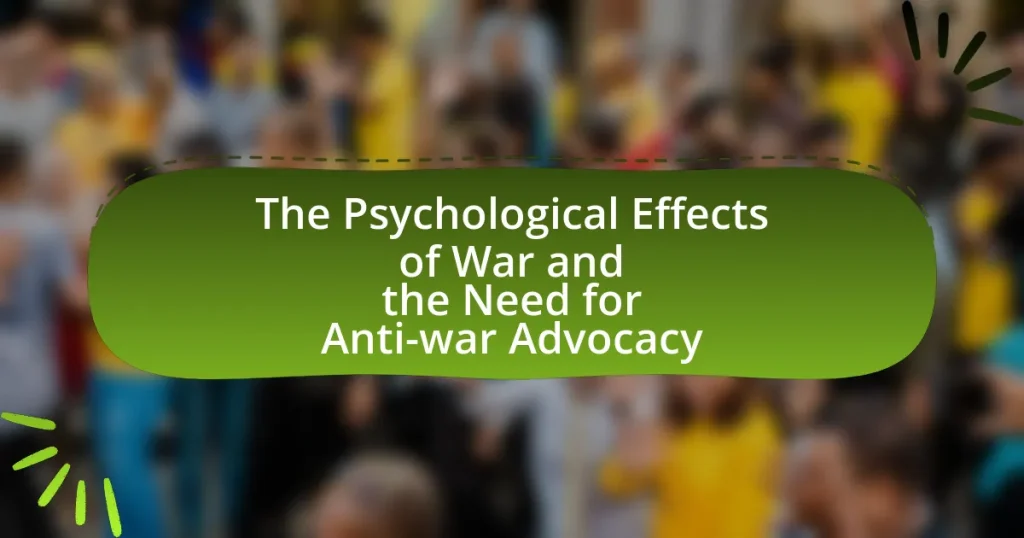The article examines the relationship between economic inequality and war, highlighting how significant disparities in wealth and income increase the likelihood of conflict. It discusses various mechanisms through which economic inequality fosters social unrest, grievances, and political instability, leading to violence and militarism. Historical examples, such as the French and Russian Revolutions, illustrate the connection between economic disparities and armed conflict. The article emphasizes the importance of addressing economic inequality as a means to promote peace and prevent future wars, outlining effective policies and strategies for reducing disparities and fostering social cohesion.
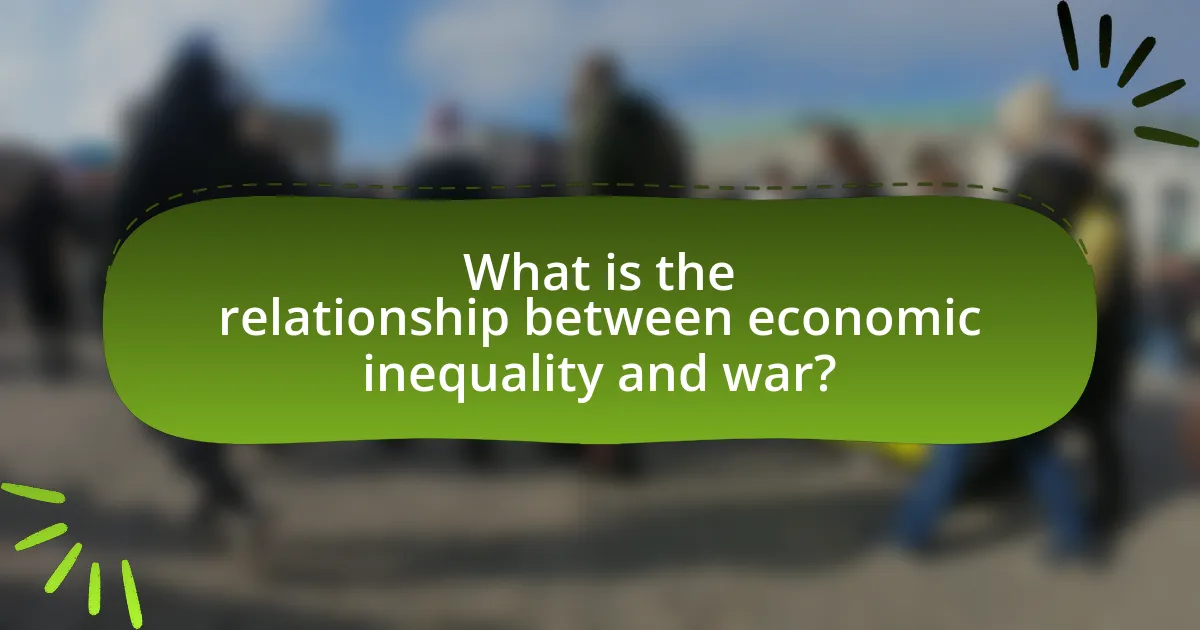
What is the relationship between economic inequality and war?
Economic inequality is positively correlated with the likelihood of war. Research indicates that societies with significant disparities in wealth and income are more prone to conflict, as these inequalities can lead to social unrest, grievances, and a sense of injustice among marginalized groups. For instance, the study “Economic Inequality and Civil Conflict” by Paul Collier and Anke Hoeffler highlights that countries with higher income inequality experience a greater risk of civil war, as economic disparities often fuel tensions and violence. This relationship is further supported by historical examples, such as the civil wars in countries like Rwanda and Syria, where economic inequality played a critical role in the escalation of conflict.
How does economic inequality contribute to the likelihood of conflict?
Economic inequality significantly increases the likelihood of conflict by fostering social tensions and grievances among marginalized groups. When wealth is concentrated in the hands of a few, it often leads to feelings of disenfranchisement and resentment among those who are economically disadvantaged. Research indicates that countries with high levels of income inequality, such as South Africa and Brazil, experience higher rates of violent crime and civil unrest, as marginalized populations may resort to conflict as a means of expressing their frustrations and seeking change. Additionally, the presence of economic disparities can weaken social cohesion, making it easier for extremist groups to recruit individuals who feel excluded from economic opportunities, thereby escalating the potential for conflict.
What historical examples illustrate this connection?
Historical examples illustrating the connection between economic inequality and war include the French Revolution and the Russian Revolution. In the French Revolution (1789-1799), widespread economic disparity and social injustice fueled public unrest, leading to the overthrow of the monarchy and subsequent conflicts. Similarly, the Russian Revolution (1917) was driven by extreme economic inequality, where the impoverished working class revolted against the wealthy elite, resulting in a civil war and the establishment of a communist regime. Both instances demonstrate how significant economic disparities can incite revolutionary movements and armed conflict.
How do different forms of economic inequality impact social stability?
Different forms of economic inequality negatively impact social stability by fostering resentment, social unrest, and conflict. For instance, income inequality can lead to a sense of injustice among lower-income groups, which may result in protests or riots, as evidenced by the 2011 London riots that were partly attributed to economic disparities. Additionally, wealth inequality can create divisions that undermine social cohesion, as seen in countries like Brazil, where stark economic divides correlate with higher crime rates and social violence. Research indicates that societies with greater economic inequality experience more frequent civil disturbances, highlighting the direct link between economic disparities and social instability.
Why is understanding this relationship important for anti-war perspectives?
Understanding the relationship between economic inequality and war is crucial for anti-war perspectives because it highlights how disparities in wealth can fuel conflict and violence. Research indicates that nations with high levels of economic inequality are more prone to civil unrest and war, as marginalized groups may resort to violence when they feel excluded from economic opportunities. For instance, a study by the World Bank found that countries with a Gini coefficient above 0.4, indicating significant inequality, often experience higher rates of internal conflict. This understanding allows anti-war advocates to address the root causes of conflict, promoting policies aimed at reducing inequality as a means to prevent war.
What role does economic inequality play in fueling militarism?
Economic inequality significantly fuels militarism by creating social tensions and instability. When wealth is concentrated in the hands of a few, it often leads to disenfranchisement and resentment among the majority, which can manifest in social unrest. Historical evidence shows that countries with high levels of economic inequality, such as Brazil and South Africa, have experienced increased militarization as governments respond to civil discontent with force. Additionally, economic disparities can drive nations to invest more in military capabilities as a means of maintaining control and suppressing dissent, further perpetuating a cycle of violence and militarism.
How can addressing economic inequality reduce the risk of war?
Addressing economic inequality can reduce the risk of war by fostering social cohesion and stability within societies. When wealth is distributed more equitably, marginalized groups are less likely to feel disenfranchised, which decreases the likelihood of social unrest and conflict. Research indicates that countries with lower levels of economic inequality, such as the Nordic nations, tend to experience fewer instances of civil conflict and war. For example, the World Bank has found that high levels of inequality can lead to increased political instability, which is a significant risk factor for conflict. Thus, reducing economic disparities can create a more peaceful society by promoting inclusivity and reducing grievances that often lead to violence.
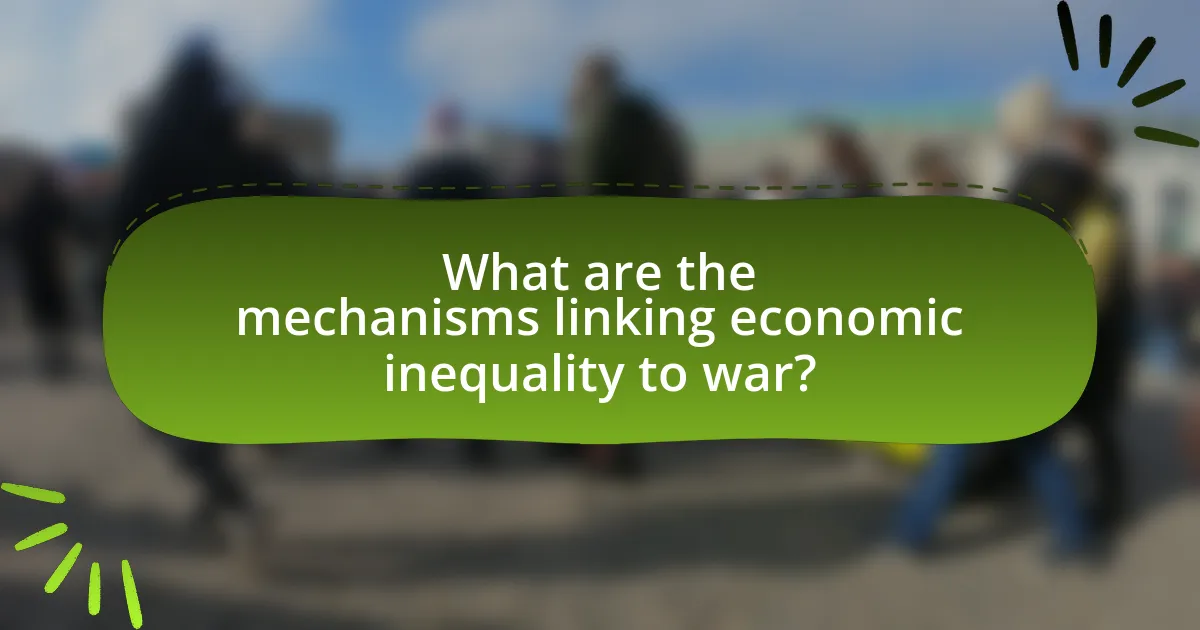
What are the mechanisms linking economic inequality to war?
Economic inequality can lead to war through several mechanisms, including social unrest, resource competition, and political instability. Social unrest arises when marginalized groups perceive systemic injustice, leading to protests or violent uprisings, as seen in the Arab Spring, where economic disparities fueled conflict. Resource competition occurs when unequal access to resources, such as land or water, heightens tensions between groups, often resulting in conflict, exemplified by the Darfur conflict in Sudan. Political instability is exacerbated by economic inequality, as it can undermine governance and create power vacuums, making societies more susceptible to conflict, as evidenced by the civil wars in countries like Liberia and Sierra Leone. These mechanisms illustrate how economic inequality can create conditions ripe for war.
How do resource distribution and access influence conflict?
Resource distribution and access significantly influence conflict by creating disparities that lead to competition and tension among groups. When resources such as land, water, and wealth are unevenly distributed, marginalized communities often feel deprived, which can escalate into grievances and violence. For instance, the Rwandan Genocide in 1994 was partly fueled by competition over land and economic resources between the Hutu and Tutsi populations, highlighting how unequal access can lead to catastrophic outcomes. Additionally, research by the World Bank indicates that countries with high levels of economic inequality are more prone to civil unrest, as unequal resource distribution fosters resentment and social division.
What are the effects of poverty on societal tensions?
Poverty significantly increases societal tensions by exacerbating inequality and fostering resentment among different social groups. When individuals lack access to basic resources such as education, healthcare, and employment opportunities, frustration and hopelessness can lead to social unrest and conflict. For instance, a study by the World Bank indicates that countries with higher poverty rates often experience increased crime rates and civil unrest, as marginalized populations feel excluded from economic and social systems. Additionally, the United Nations Development Programme highlights that poverty can lead to political instability, as disenfranchised groups may resort to violence to express their grievances. Thus, the effects of poverty on societal tensions manifest through heightened inequality, social unrest, and potential conflict.
How does wealth concentration affect political power dynamics?
Wealth concentration significantly influences political power dynamics by enabling affluent individuals and corporations to exert disproportionate influence over political processes and decision-making. This concentration allows wealthy entities to fund political campaigns, lobby for favorable legislation, and shape public policy, often prioritizing their interests over those of the general populace. For instance, research by Gilens and Page (2014) in “Testing Theories of American Politics: Elites, Interest Groups, and Average Citizens” demonstrates that economic elites have substantial sway over policy outcomes, while the preferences of average citizens have minimal impact. This dynamic can lead to policies that exacerbate inequality and undermine democratic processes, as the interests of the wealthy become prioritized in governance.
What psychological factors are involved in the relationship?
Psychological factors involved in the relationship between economic inequality and war include perceived injustice, social identity, and group conflict. Perceived injustice arises when individuals or groups feel that resources and opportunities are distributed unfairly, leading to resentment and potential aggression. Social identity influences how individuals view themselves in relation to others, often fostering in-group favoritism and out-group hostility, which can escalate tensions. Group conflict theory suggests that competition for scarce resources, exacerbated by economic inequality, can lead to hostility and violence between groups. Research indicates that societies with high levels of inequality experience increased social unrest and conflict, as evidenced by studies linking economic disparities to higher rates of civil violence and war.
How does perceived injustice lead to conflict?
Perceived injustice leads to conflict by creating feelings of resentment and anger among individuals or groups who believe they have been wronged. This sense of unfairness can motivate people to take action, often resulting in protests, violence, or warfare as they seek to rectify the perceived wrongs. Research indicates that when economic inequality is present, individuals who feel marginalized or disadvantaged are more likely to perceive injustices in their social and economic conditions, which can escalate tensions and lead to conflict. For example, the 2011 Arab Spring was fueled by widespread perceptions of injustice related to economic disparities and government corruption, demonstrating how perceived injustice can catalyze significant social upheaval.
What role does social identity play in exacerbating tensions?
Social identity plays a critical role in exacerbating tensions by fostering in-group and out-group dynamics that can lead to conflict. When individuals identify strongly with a particular social group, such as ethnicity, religion, or nationality, they may develop biases against those outside their group, which can escalate into hostility and violence. Research indicates that social identity can amplify perceptions of threat and competition, particularly in contexts of economic inequality, where resources are scarce and groups vie for power and status. For example, the 1994 Rwandan Genocide was fueled by deep-seated ethnic identities that were manipulated to incite violence, illustrating how social identity can be a catalyst for conflict in situations marked by economic disparity.
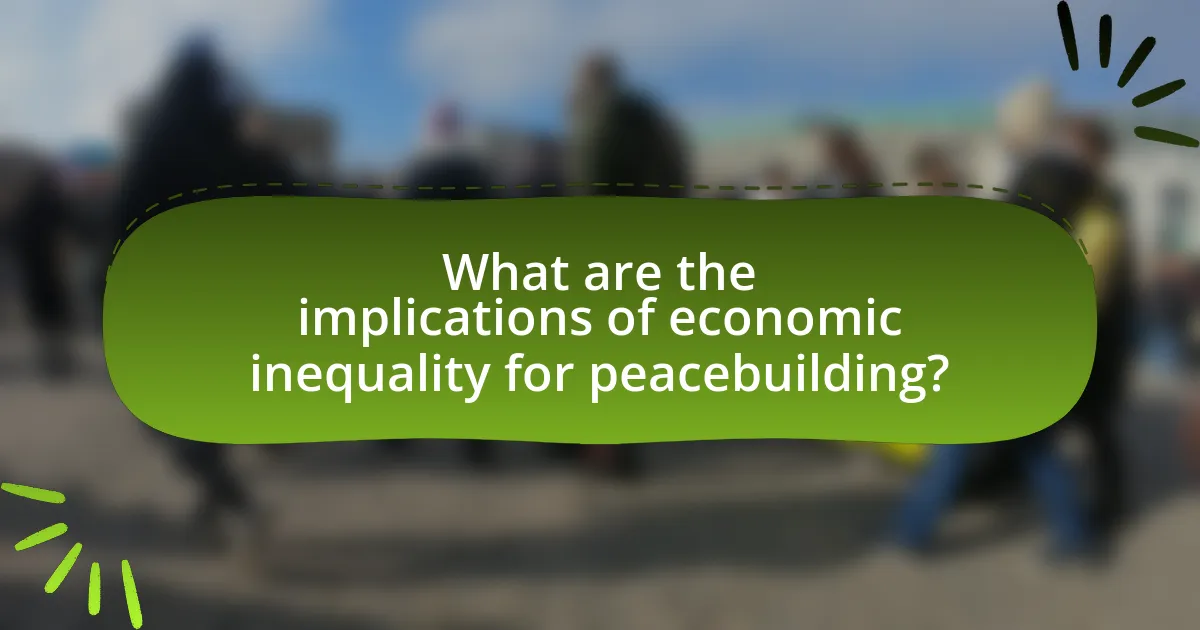
What are the implications of economic inequality for peacebuilding?
Economic inequality significantly undermines peacebuilding efforts by fostering social unrest and conflict. When wealth is concentrated in the hands of a few, marginalized groups often experience frustration and resentment, leading to increased tensions and potential violence. Research indicates that countries with high levels of economic disparity are more prone to civil wars and social upheaval; for instance, a study by the World Bank found that income inequality can increase the likelihood of conflict by up to 50%. Furthermore, economic inequality hampers access to resources and opportunities, perpetuating cycles of poverty and disenfranchisement, which further destabilizes societies and complicates peacebuilding initiatives.
How can reducing economic inequality promote peace?
Reducing economic inequality can promote peace by addressing the root causes of social unrest and conflict. When wealth is distributed more equitably, marginalized groups experience improved access to resources, education, and opportunities, which can lead to greater social cohesion. Research indicates that countries with lower levels of economic inequality tend to have lower rates of violent conflict. For example, a study published in the Journal of Peace Research found that nations with higher income equality, such as the Nordic countries, experience fewer internal conflicts and lower crime rates. This correlation suggests that reducing economic disparities can foster a more stable and peaceful society by mitigating grievances that often lead to violence.
What policies have been effective in addressing inequality?
Progressive taxation has been effective in addressing inequality by redistributing wealth from higher-income individuals to fund social programs. Countries like Sweden and Denmark implement high tax rates on the wealthy, which finance universal healthcare, education, and social welfare systems, significantly reducing income disparity. Research from the OECD indicates that such policies can lower income inequality by up to 10% in developed nations. Additionally, minimum wage laws and labor protections have been shown to uplift low-income workers, contributing to a more equitable income distribution. For instance, studies in the United States reveal that states with higher minimum wages experience reduced poverty rates and improved economic mobility.
How can international cooperation help mitigate these issues?
International cooperation can significantly mitigate issues related to economic inequality and war by fostering dialogue, sharing resources, and implementing joint policies. Collaborative efforts among nations can lead to the establishment of frameworks that address the root causes of inequality, such as poverty and lack of access to education. For instance, initiatives like the United Nations Sustainable Development Goals aim to reduce inequalities and promote peace, demonstrating that coordinated action can yield measurable progress. Historical examples, such as the Marshall Plan post-World War II, illustrate how international cooperation can rebuild economies and prevent conflict by addressing disparities.
What lessons can be learned from past conflicts?
Lessons learned from past conflicts include the recognition that economic inequality often exacerbates tensions and can lead to war. Historical examples, such as the French Revolution and the Russian Revolution, illustrate how disparities in wealth and social injustice can ignite widespread unrest. Additionally, the aftermath of World War I demonstrated that punitive economic measures, like reparations imposed on Germany, can foster resentment and instability, ultimately leading to further conflict. These instances underscore the importance of addressing economic disparities and promoting equitable resource distribution to prevent future wars.
How have successful peace processes addressed economic disparities?
Successful peace processes have addressed economic disparities by implementing inclusive economic policies that promote equitable resource distribution and development. For instance, the 1996 Peace Accords in Guatemala included provisions for land reform and access to credit for marginalized communities, aiming to reduce the economic gap between different social groups. Additionally, the 2016 Colombian Peace Agreement emphasized rural development and investment in infrastructure to uplift impoverished regions, directly targeting economic inequality as a root cause of conflict. These approaches demonstrate that addressing economic disparities is crucial for sustainable peace, as evidenced by the positive outcomes in post-conflict recovery and stability in these nations.
What strategies can be implemented to prevent future conflicts?
To prevent future conflicts, implementing strategies that address economic inequality is essential. Economic policies aimed at reducing disparities, such as progressive taxation and equitable access to education and healthcare, can mitigate the root causes of conflict. Research indicates that countries with lower levels of economic inequality experience fewer instances of civil unrest and violence, as seen in the Nordic countries, which prioritize social welfare and inclusive economic growth. Additionally, fostering dialogue and cooperation among diverse social groups can build trust and understanding, further reducing the likelihood of conflict.
What practical steps can individuals take to combat economic inequality and promote peace?
Individuals can combat economic inequality and promote peace by actively supporting fair wages and advocating for policies that ensure equitable access to resources. Engaging in community initiatives that provide education and job training can empower marginalized groups, thereby reducing economic disparities. Supporting local businesses and cooperatives fosters economic resilience and community solidarity. Additionally, participating in advocacy for social justice policies, such as progressive taxation and universal basic income, can help redistribute wealth more equitably. Research indicates that countries with lower economic inequality tend to experience less social unrest and violence, highlighting the importance of these actions in promoting peace.
How can community engagement foster economic equity?
Community engagement can foster economic equity by actively involving individuals in decision-making processes that affect their economic conditions. When communities participate in local governance, they can advocate for policies that address disparities, such as equitable access to resources, job opportunities, and education. Research shows that areas with high levels of community engagement often experience improved economic outcomes, as collective action leads to better allocation of resources and increased investment in underserved neighborhoods. For instance, a study by the Urban Institute found that community-driven initiatives can reduce poverty rates by up to 20% in targeted areas, demonstrating the direct impact of engagement on economic equity.
What role do advocacy and policy change play in this effort?
Advocacy and policy change are crucial in addressing economic inequality and its link to war by promoting equitable resource distribution and conflict prevention strategies. Effective advocacy raises awareness about the detrimental effects of economic disparities on social stability, thereby influencing policymakers to implement reforms that mitigate inequality. For instance, research indicates that nations with lower income inequality tend to experience fewer conflicts, highlighting the importance of policies aimed at wealth redistribution and social welfare programs. By mobilizing public support and engaging stakeholders, advocacy efforts can lead to legislative changes that prioritize economic justice, ultimately contributing to a more peaceful society.
